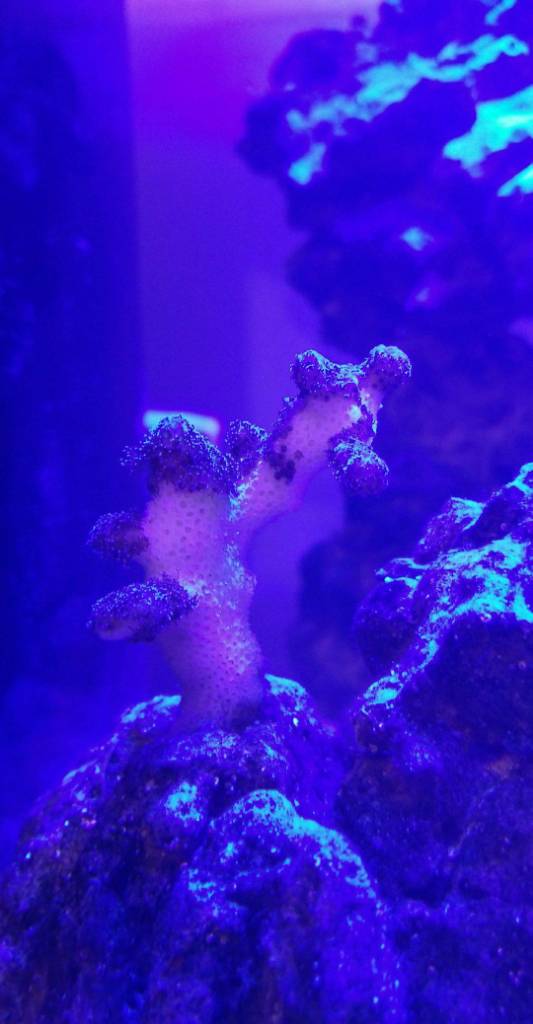- Joined
- Feb 20, 2017
- Messages
- 255
- Reaction score
- 28
Whats the best thing to dose for phosphates?I'd personally dose so you have control and don't risk dinos.
Follow along with the video below to see how to install our site as a web app on your home screen.
Note: This feature may not be available in some browsers.
Whats the best thing to dose for phosphates?I'd personally dose so you have control and don't risk dinos.
It's about 8-9 months old.Sounds like po4 could be a help. When referring to the current algae on the rocks, how old is the system?
I use a generic form of seachems product here:
http://www.seachem.com/flourish-phosporus.php
Keep in mind it only takes a few drops a day to keep it detectable in 100 gallons of water volume, depending on how much you feed the fish. I feed in the evenings and dose P in the morning to keep it consistent. Also keep an eye on the nitrates as I've found dosing N reduces P and vice versa. It will most definitely increase the algae film on the glass even at levels around .015. When I started daily dosing my tank also went though another little "ugly stage" but the tank will mature another step as it did in the beginning. It will mature and go away like usual. The important thing is the health of the corals.
I have experienced health issues when one element is way out of wack in relationship to the other, referring to the redfield ratio. I don't think they need to be 16:1 but I try to keep both in relation somewhat. I wouldn't worry about nitrates of 10. One of my tanks runs really well between .75 and 5, while another I've increased from 25 to 35ish because the corals were looking too pale. Obviously there are other factors that come into play that I don't understand, but I see what I see. 25, No algae, or film, starving corals. The other can be 3, algae film all over.
I think maturity plays a big part. Even if you have top notch equipment and do everything correct (with patients) from the start, a tank started with dry rock is not mature at one year imho.
randy would closing my skimmer help with phosphate?I'd personally dose so you have control and don't risk dinos.

randy would closing my skimmer help with phosphate?
Losing tissue my bad.You've mentioned bleaching and the term seems to be generically used fairly often so I wanted to get some clarification; are your corals losing color or are they losing tissue?
See the photo.Losing tissue my bad.

Alkalinity 7.5 salinity 1.025 I don't really test every day.OK, that is commonly referred to as STN or RTN (slow or rapid tissue necrosis). Bleaching generally describes something as losing color. It is unlikely that nitrates and phosphates have caused this (especially given your levels). Alkalinity and salinity would be the things I'd probably look at in this case; for example, what are the current levels, have the current levels been stable (i.e. no or very little fluctuation day to day), and what are you using to measure them with?
Why are you saying that limited nutrition for the corals can't be causing This?OK, that is commonly referred to as STN or RTN (slow or rapid tissue necrosis). Bleaching generally describes something as losing color. It is unlikely that nitrates and phosphates have caused this (especially given your levels). Alkalinity and salinity would be the things I'd probably look at in this case; for example, what are the current levels, have the current levels been stable (i.e. no or very little fluctuation day to day), and what are you using to measure them with?
Correct, however I do think that some algea looking outbreaks come from an imbalance in parameters and once that will Straighten out and under control it will go away. Or another option Is to keep nutrients very low and target feed the corals.You cant starve out algae and expect coral to live. It just wont happen. You just gotta keep nutrients in the tank and use predators so algae cant grow to plague proportions.
Why are you saying that limited nutrition for the corals can't be causing This?
Do you feed your corals?Because my tank has very low nitrates (difficult to measure but generally 0 to <.2 on a Salifert kit) for the better part of five months and phosphates of 0-.05ppm for the same period. I dosed nitrates for about a month and saw no difference so I stopped doing it. My SPS have maintained good color and are growing just fine.
The "limited nutrition" would have manifested differently in regard to your corals response. While hard to judge coloration in your picture because of the quality, that coral appears to have good color but is suffering from RTN.
So then you do feed your corals, just not targeting feed.Nope, I feed the fish LRS Reef and Herbivore Frenzy twice a day (alternating between the two).
